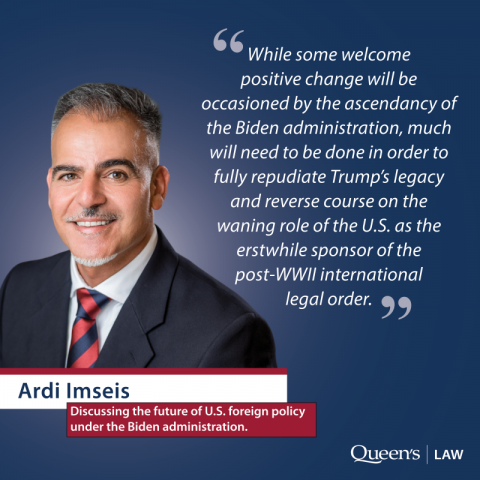
With the Biden inauguration dominating international news, six Queen’s Law experts are stating their predictions for how the new government will have an impact on Canada and across the globe. In today’s feature of the six-part series, Professor Ardi Imseis broadly examines elements of U.S. foreign policy.
Enhancing international peace and security, but with notable remaining concerns
The election of Donald Trump signaled the end of what some have called the “American Century,” from Woodrow Wilson’s Fourteen Points and the establishment of the League of Nations through the emergence of the UN system of collective security. In the past four years, the Trump administration has unleashed an unprecedented attack on the international rule of law and the post-WWII multilateral order that, ironically, was in large part fashioned by the U.S. itself. It is therefore unsurprising that Joe Biden’s election has been met with hope that it will reverse Trump’s more destructive and isolationist policies borne of an unadulterated disdain for international law and institutions, adherents of which predate him and remain in the Washington beltway.
In addition to a re-joining of the Paris climate agreement and a repeal of the U.S. “Muslim travel ban,” among the more immediate changes we can expect under Biden will be a more constructive engagement with some international and regional organizations, including the World Health Organization, the World Trade Organization, the European Union, and the North Atlantic Treaty Organization. In this vein, two areas on which we can expect positive change, albeit without knowing whether a complete return to the pre-January 2017 status quo will be on offer, are a more constructive U.S. policy toward Iran’s development of nuclear energy, including a reversal of the U.S. withdrawal from the Joint Comprehensive Plan of Action, and a re-institution of vital humanitarian funding for the UN Relief and Works Agency.
Although there are suggestions that the Biden administration will work to curtail the U.S.’s role as the leading arms supplier to the Saudi-led coalition in Yemen – the site of the world’s worst humanitarian crisis – the jury is still out on whether this will actually come to pass. Still less hopeful will be any change to the present U.S. rejection of the legitimacy of the International Criminal Court and the UN Human Rights Council. This will be exacerbated by continued American double standards in the application of international law in its foreign policy as evidenced by its rightful rejection of Russia’s illegal claims of sovereignty over occupied Crimea, on the one hand, with the U.S.’s illegal recognition of similar claims by Morocco in occupied Western Sahara and Israel in occupied Palestine, on the other.
All this to say, while some welcome positive change will be occasioned by the ascendancy of the Biden administration, much will need to be done in order to fully repudiate Trump’s legacy and reverse course on the waning role of the U.S. as the erstwhile sponsor of the post-WWII international legal order.”
Professor Ardi Imseis specializes in public international law. He is a member of the United Nations Group of Eminent International and Regional Experts on Yemen and a former United Nations official with both the United Nations Relief and Works Agency for Palestine Refugees and the United Nations High Commissioner for Refugees.